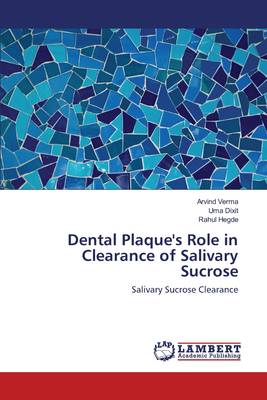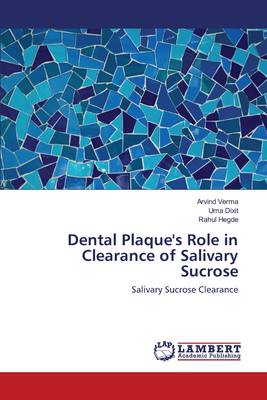
Door een staking bij bpost kan je online bestelling op dit moment iets langer onderweg zijn dan voorzien. Dringend iets nodig? Onze winkels ontvangen jou met open armen!
- Afhalen na 1 uur in een winkel met voorraad
- Gratis thuislevering in België vanaf € 30
- Ruim aanbod met 7 miljoen producten
Door een staking bij bpost kan je online bestelling op dit moment iets langer onderweg zijn dan voorzien. Dringend iets nodig? Onze winkels ontvangen jou met open armen!
- Afhalen na 1 uur in een winkel met voorraad
- Gratis thuislevering in België vanaf € 30
- Ruim aanbod met 7 miljoen producten
Zoeken
Dental Plaque's Role in Clearance of Salivary Sucrose
Salivary Sucrose Clearance
Arvind Verma, Uma Dixit, Rahul Hegde
Paperback | Engels
€ 48,45
+ 96 punten
Omschrijving
It is well established that fermentable carbohydrates and microorganisms in plaque play a significant role in pathogenesis of dental caries. The sugar most commonly associated with dental caries is sucrose and has been termed as the 'arch criminal of dental caries'. The properties of carbohydrates that make them more cariogenic include type of sugar, consistency, oral retention, concentration of sugar, and frequency of ingestion. Cariogenic microorganisms in dental plaque metabolize fermentable carbohydrates into organic acids, which in turn cause demineralization of the enamel below the critical pH. Thus salivary pH plays an important role in initiation of caries. Since cariogenic effects are, in part, related to the retention time of carbohydrates in the mouth as a result of their acidogenicity, the role of saliva in oral carbohydrate clearance is of primary interest. The salivary clearance of sugars is influenced by the properties of the foodstuff, the amount of ingested carbohydrate the sampling site in the mouth and physiological factors such as the volume of saliva present in mouth before and after swallowing.
Specificaties
Betrokkenen
- Auteur(s):
- Uitgeverij:
Inhoud
- Aantal bladzijden:
- 80
- Taal:
- Engels
Eigenschappen
- Productcode (EAN):
- 9783659129919
- Verschijningsdatum:
- 31/05/2012
- Uitvoering:
- Paperback
- Formaat:
- Trade paperback (VS)
- Afmetingen:
- 152 mm x 229 mm
- Gewicht:
- 127 g

Alleen bij Standaard Boekhandel
+ 96 punten op je klantenkaart van Standaard Boekhandel
Beoordelingen
We publiceren alleen reviews die voldoen aan de voorwaarden voor reviews. Bekijk onze voorwaarden voor reviews.











